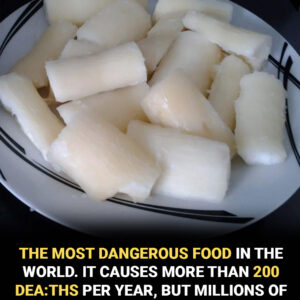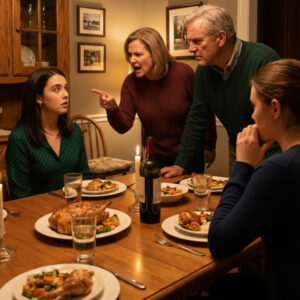“Wait… what was that?” I froze mid-step on my way to the station as a thin, wavering sound cut through the February wind. The cold stung my cheeks and whipped at my coat, but beneath the howl I heard it again—soft, fragile, and desperate.
A cry.
It came from near the tracks, where the old switchman’s hut slouched against the snowy landscape. I spotted a dark bundle pressed against the steel rails.
My heart lurched.

I moved slowly at first, then faster. A threadbare, filthy blanket covered something small. Too small. A tiny hand peeked out—red, trembling, nearly frozen.
“Oh my God…” I whispered, my voice breaking.
I dropped to my knees. Inside the blanket was a baby—a little girl, barely a year old. Her lips were blue, her weak whimpers fading as if she didn’t have the strength to cry anymore.
I scooped her up, pressing her to my chest, opening my coat to shield her. She was ice-cold. Terrifyingly light.
And then I ran.
I sprinted toward the village—toward Mary Peterson, our only paramedic—praying the child would keep breathing.
“Zina, what in the world—?” Mary gasped the moment she saw me.
“Found her by the tracks,” I panted. “She was freezing.”
Mary took the baby gently, her practiced hands checking for life. “She’s cold… but alive. Thank God.”
“We need to call the police,” she said, reaching for the phone.
Panic surged through me. “They’ll send her to an orphanage,” I insisted. “She won’t survive the trip.”
Mary hesitated. Then, with a resigned sigh, she opened a cupboard. “I have some baby formula from my granddaughter’s last visit. It should help. But Zina… what are you planning to do?”
I looked at the small face resting against my sweater, her breath warming the fabric. She had stopped crying.
“I’m going to raise her,” I said softly. “There’s no other way.”
The whispers started immediately.
“She’s thirty-five, never married, lives alone—and now she’s picking up abandoned babies?”
Let them talk. They didn’t know the lonely silence that had filled my home for years. They didn’t know how easily love can enter a life through a single unexpected moment.
With help from friends at the town office, I filed every necessary paper. No relatives were found. No missing child reported.
I named her Emily.
The first year nearly broke me—sleepless nights, fevers, teething, crying that pierced my bones. But every hardship brought something beautiful. Her first smile. The first time she reached for me. Her tiny head resting on my shoulder after a long night.
Then one morning, at ten months old, she looked up at me and said, “Ma!”
The word undid me. Tears flowed freely. After a lifetime of solitude, someone finally needed me.
From then on, we were inseparable.

At two, she was a whirlwind—chasing the cat, tugging curtains, exploring every corner of the house. At three, she recognized every letter in her picture books. By four, she was telling full stories.
“She’s gifted,” my neighbor Gloria marveled. “I don’t know how you do it.”
“It’s not me,” I said. “She’s just meant to shine.”
At five, I hitchhiked every morning to take her to preschool in the next town. Her teachers were astonished.
“She reads better than most seven-year-olds,” they said.
When she started school, her long chestnut braids swung as she walked. I tied those ribbons perfectly each morning. I never missed a parent meeting. Every teacher praised her.
“Mrs. Bennett,” one said, “Emily is the kind of student we dream of teaching. She’s going to go far.”
My heart swelled. My daughter.
She grew into a poised, determined young woman. Bright blue eyes. A calm confidence. She won spelling bees, math competitions, science fairs. Everyone in town knew her name.
Then one evening in tenth grade, she came home glowing.
“Mom, I want to be a doctor.”
I blinked. “That’s incredible, sweetheart. But how will we afford everything—university, the city, rent?”
“I’ll get a scholarship,” she said with certainty. “I’ll figure it out.”
And she did.
When her acceptance letter arrived, I cried for two days—half joy, half fear of letting her go.
“Don’t cry, Mom,” she said at the station, squeezing my hand. “I’ll visit every weekend.”
Of course she couldn’t. Life in the city swallowed her whole. But she called every evening.
“Mom! I aced anatomy!”
“Mom! We delivered a baby today!”
Every call made my small house feel warm again.
In her third year, she called with a shy tremor in her voice.
“I met someone.”
Josh. Kind eyes, polite manners, a soft laugh. He helped clear the table after Christmas dinner and thanked me twice for the meal.
“Good one,” I whispered.
“Right?” she giggled.
She became a pediatric resident—of course she did.
“You saved me once,” she said. “Now I want to save kids.”
I couldn’t have been prouder.

Then came the phone call that changed everything.
“Mom… can I come tomorrow? I need to talk to you.”
She arrived the next afternoon, subdued and pale.
“What’s wrong?” I asked.
She sat down slowly. “Two people came to the hospital. A man and a woman. They said they were my aunt and uncle—my biological mother’s siblings. Their niece went missing 25 years ago.”
My breath left me.
“They had photos. DNA tests. Everything. It’s… real.”
Silence hung between us.
“They abandoned you,” I whispered. “Left you in the snow.”
“They say it wasn’t them. My parents—my biological parents—they were fleeing something violent. They got separated at the station. They searched for me for years.”
“And your parents?” I asked quietly.
She swallowed. “Gone. Ten years now. A car accident.”
I couldn’t speak.
Emily’s fingers curled around mine. “They don’t want anything. They just wanted me to know I wasn’t thrown away.”
“What do you want to do?” I asked.
“I don’t know,” she said in a trembling whisper. “I just needed to tell you.”
I took her hands. “Emily, you are my daughter. I found you. I raised you. I loved you every single day of your life.”
Tears spilled down her cheeks. “I know, Mom. And I’m not going anywhere. You’re my mother. Forever.”
A year has passed.
Emily visits those relatives from time to time. They’re a quiet part of her story now—but not the center of it.
Every morning, she calls me. She sends pictures of her patients, funny moments from the clinic, little triumphs from her day.
Last month, she and Josh got engaged. The wedding is in spring. She gave me the honor that shattered my heart in the best way.
“Mom,” she said, “I want you to walk me down the aisle. You saved my life. And you gave me everything that came after.”
So I will walk beside her—this brilliant, kind woman who once lay crying by the railroad tracks—proudly and gratefully, for every step the world lets us share.




